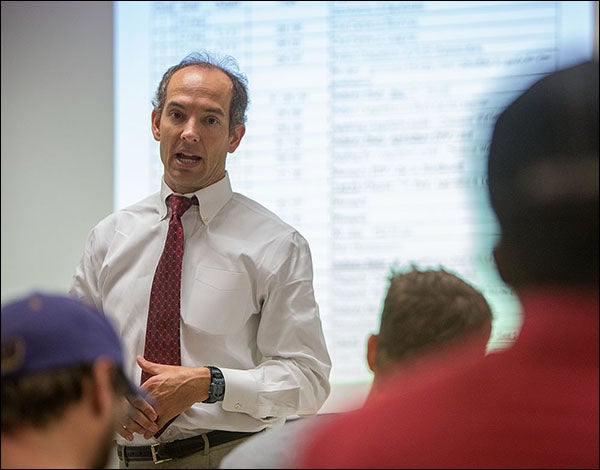HOMEWORK HELPS
ECU research shows homework completion improves grades

ECU economics professor Dr. Nick Rupp conducted research that demonstrated grade improvements for students who completed homework. (Photo by Cliff Hollis)
Students may think that arriving at East Carolina University means escaping from parents and constant reminders to “Do your homework!” However, those out-of-class exercises could affect college students’ academic success – at least if they’re studying economics.
Department of Economics professor Dr. Nick Rupp, who counts education tactics among his research interests, recently published the results of a study in which he found that doing homework assignments leads to higher test grades.
“There’s always been anecdotal evidence,” he explained, “but I wanted to explore it scientifically.”
After students in multiple sections of his principles of microeconomics class consented to participate in his study, Rupp handed out two different syllabi to participants. One group of students was required to do homework and turn it in to be graded. Those assignments accounted for 10 percent of their final grade. For a second group, homework was optional, so test scores made up 100 percent of their grades.
Individual students were assigned to the groups via a simple exercise: a coin flip.
“The classroom had kind of a football crowd mentality (on the day of the coin flip),” Rupp said. He added that those who landed in the homework-optional group were initially overjoyed.
But in the end, it was the students required to do homework who were cheering. They performed a half-letter grade better, on average, than those who did not have to complete homework assignments.
Rupp observed that there were A-students in both groups – those who would do their homework whether or not it was required. The biggest difference was for students who initially performed poorly in the course. More Bs than Cs were earned by the group required to do homework, he said. Homework completion also could cause students to pass a course they were otherwise on the brink of failing.
It wasn’t because the homework grades helped them, but because they were learning more before the test.
“The perception is that homework is easy points,” Rupp said. “But the test average (grade) was higher than the homework average.”
No students’ grades suffered due to participation in the study, Rupp said. The add/drop rate for the class was no different than others he’s taught. And every student did have access to the homework and the option to complete it and have it graded.
However, he also observed that those students not required to do the homework would often wait until just before the test to complete all the exercises. They were “cramming,” he said, and it didn’t pay off. Those students didn’t get feedback to know what they might have done wrong and what to study before testing.
Assigning homework does mean more work for one other party – those teaching college classes. Rupp said that his research indicates that two-thirds of professors at the seven largest campuses in the UNC system assign homework, but another third does not.
“This is a joint message – about the importance of doing homework – to both the students and the educators,” Rupp said. “There is more work but if you care about student performance and keeping students in your class…it does pay dividends.”
Rupp plans to conduct a similar study involving homework in chemistry classes, to see if his findings can be applied to other academic subjects.
“The Role of Homework in Student Learning Outcomes: Evidence from a Field Experiment” was published in The Journal of Economic Education. ECU associate professor Dr. Andrew Grodner, also of the Department of Economics, co-authored the article.
The full text of the study is available online: